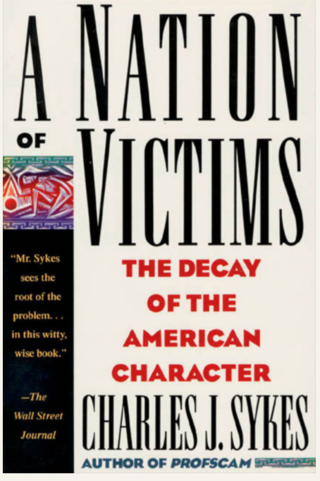Bullying
“A Nation of Victims” Revisited
Antibullyism is the unified field theory of oppression.
Posted March 16, 2018

In my recent writings, I’ve been expressing optimism that the pendulum is swinging away from the political correctness that has overtaken the social sciences and back toward reason, thanks to the work of influential psychology professors like Jonathan Haidt and Jordan Peterson. My hope is that this development will pave the way for reforming the counterproductive anti-bullying movement (or antibullyism, as I prefer to describe this movement), which is, as I will explain, the ultimate in political correctness.
The nature of political correctness
The term “political correctness” has a long history and can mean different things to different people. But what it has come to mean today can perhaps be summed up as, “the prohibition against offending the feelings of anyone based on their membership in an oppressed victim group.“ It is strictly about protecting feelings, not bodies, property, or freedom of action. In other words, as opposed to the latter actions, which cause objective harm and are therefore criminal, it is about forbidding subjective harm, which is protected by the right to freedom of speech. For instance, if you break my nose, burglarize my house, or spread lies about me to get me fired from my job, you have caused me objective harm; you are the one who hurt me, and that is a punishable offense. If you criticize me for being gay and I get upset, your action caused subjective harm, meaning I upset myself. Even though your criticism is permitted under the Constitutional right to freedom of speech, political correctness would treat your behavior as though it were a punishable offense.
Complaints about political correctness are not new. For a few decades, political correctness has been fodder for talk shows, newspapers and books. However, complaints about political correctness have been less prevalent within the field of psychology, probably because the field itself has been a key architect of political correctness.
Political correctness within the school system
I began sensing this once I took a position as a school psychologist in New York City in 1988. I had previously worked for a decade in Israel, where my activities were focused on equipping individuals with the psychological skills needed to overcome problems in school and life. In the USA, the nature of the job changed dramatically, with “promotion of diversity” being an ever-present expectation. Initially, this seemed reasonable to me, as the United States has been a melting pot of diverse immigrants. Moreover, my own parents were Holocaust survivors who never ceased blessing the United States for the wonderful new life it afforded them. I was also frequently attacked verbally and physically in my youth for being a Jew. Thus, I was intimately familiar with the destruction that can be caused by racial and religious hatred, discrimination and violence. I have always been a staunch advocate for a harmonious, inclusive society.
Nevertheless, with the passage of time, the feeling that I was functioning within a scientifically directed field waned. Psychology within the school system became less about empowering individuals to handle the difficulties of life and more about protecting them from those difficulties. Our professional organizations were encouraging us to engage in political activism, to fight for laws advancing the rights of victim groups. While such activism might be noble, it is political activity and should not be misconstrued as scientific, psychological activity.
The new political nature of psychology became strikingly obvious to me once the field committed itself to eradicating bullying in the aftermath of the Columbine massacre of 1999. This campaign was based on the previously obscure field of bullying psychology created by Prof. Dan Olweus. However, when I examined the teachings of this field, I was astounded. It was essentially the negation of everything I had learned in psychology and psychotherapy. Rather than helping individuals to understand and solve their problems, we were now supposed to fight for victims against bullies. In the ensuing years, psychology continued to promote this approach to bullying reduction despite research studies demonstrating its ineffectiveness. In 2002, I left my job with the New York City Department of Education so I could devote my efforts to promoting a truly psychological approach to bullying. I began giving seminars throughout the nation, and one of the topics I spoke about was how the field of psychology had been transforming from a branch of science into one of law enforcement, and how this process was limiting personal freedoms and promoting emotional fragility.
Push back against political correctness
I had felt rather alone in my campaign against the political influence in psychology, when five or six years ago a seminar participant recommended a 2005 book, Destructive Trends in Mental Health: The Well-Intentioned Path to Harm, a compendium of articles (not all of equal calibre) edited by highly accomplished psychologists Rogers Wright and Nicholas Cummings. I discovered I was not so alone in warning about the negative effects of political correctness within the field of psychology.
Regretfully, that courageous book has had little influence, as psychology has continued in its politically correct trajectory.
A couple of weeks ago, I reread another book that had been in my bookcase for years, A Nation of Victims: The Decay of the American Character, by Charles Sykes
In contrast to Destructive Trends…, which was written by psychologists for fellow psychological professionals, A Nation of Victims was written by a journalist for the general public. It became a major bestseller. While no author can represent absolute, complete, unbiased truth, Sykes does a commendable job of tracing the historical roots of political correctness, focusing most intensively on the civil rights movement of the previous century and the emergence of therapeutic psychology as an influence on popular thought and politics. Little by little, social activists, psychologists among them, expanded their battle for human well-being, from overturning discriminatory laws, policies and attitudes that caused objective harm to minorities and women, to fighting for rights of victim group members to be protected from subjective harm, meaning, from harm to their feelings.
This development has opened a Pandora’s box, because there is no limit to the utterances that can hurt people’s feelings, and there is no limit to the number of potential victim groups. It has instilled in our population a victim mentality that absolves us from personal responsibility for our difficult life situations, and instructs us instead to blame others and to demand that our government protect us from all unpleasant experiences. Rather than advancing harmony and understanding, as intended, political correctness has fostered hatred and violence, as people blame each other for their misery and groups fight each other for superior claims to victimhood.
A Nation of Victims is practically as relevant now as when published in 1992. You can read it today and get a full understanding of the history and the current dynamics of political correctness, as they have not changed.
Thanks to Peterson and Haidt, I recently became aware of the role of postmodern philosophy as a driver of political correctness and intolerance for diversity of thought in academia. Naively, I thought this was some new revelation. It turns out that Sykes had discussed postmodernism and its repressive effects in depth. I had also thought that criticism of social justice warfare was something new. But it isn’t. Sykes engaged in it, too, a quarter of a century ago.
Inevitably, because of its age, some of the book is anachronistic. It’s missing today’s concern with the various non-heterosexual subgroups, as society was still heavily concerned at the time with the rights of women and racial minorities. There is also no mention of microaggressions, as the concept had probably not been invented yet.
Also markedly absent from the book is concern with bullies. The word bully does not appear even once, and the word bullying only twice. That’s because the book was published seven years before the anti-bullying movement was born. But Sykes didn’t use the word bullying as it is used today – to refer to the intolerable behavior that society is committed to eradicating at all costs. He used it in the traditional sense of intimidating others to get one’s way. But in both instances, he used the word to describe the efforts of political correctness to shut out unwelcome opinions.
The unified field theory of oppression
In Chapter One, page 12, Sykes makes a prescient statement:
“On campuses of elite universities, students quickly learn the grammar and protocols of power–that the route to moral superiority and premier griping rights can be gained most efficiently through being a victim–which perhaps explains academia’s search for what one critic calls the ‘unified field theory of oppression.'" [emphasis mine]
While political correctness was at that time already close to being a “unified field theory of oppression,” the concept to clinch the role emerged at the turn of the century: BULLYING. Bullying was reborn as the unifier of all victimization, freeing victimhood from the constraints of any particular oppressed minority group. Now, anyone can attain the benefits of victim status regardless of race, religion, gender, sexual orientation, socioeconomic status, or physical and mental traits simply by claiming to be bullied. The bully can be anyone from a psychopathic mass murderer like Hitler, Pol Pot or Stalin to the three year old who grabs toys out of the hands of her pre-school classmates. Bully can be legitimately used to label politicians, writers, criminals, gang members, husbands, wives, children, parents, siblings, bosses, colleagues, teachers, neighbors–anyone who's behavior or words we don't like.
A Nation of Victims was written about political correctness, but it could have been written about the anti-bullying movement, because it is the ultimate evolution of political correctness. If you want to understand what’s wrong with antibullyism, read this book while remembering that bullying had not yet entered our routine psychological lexicon.
A cause for pessimism?
Because A Nation of Victims was so popular – and powerful – we might think that it would have turned the tide against political correctness. But it didn’t. Political correctness continued to march on, amassing an increasing list of victim groups and laws to protect them.
While I began this article on a note of optimism regarding the reversal of political correctness, if anything, A Nation of Victims is a cause for pessimism. At best, it may have slowed down the advance of political correctness. But our society is more politically correct than ever. Reading the book has, in fact, disheartened me a bit.
I am continuing my optimism for three reasons:
One, perhaps the pendulum hadn’t swung far enough to the left in 1992. Maybe it had to reach more absurd extremes before experiencing a major backlash by influential advocates of reason. Maybe people will get so fed up with trying to avoid the sin of microaggressions that social justice warriors don’t make it to the next step of condemning nanoaggressions.
Two, Peterson and Haidt are not stopping their efforts. Peterson’s popularity and influence continue to grow, and more and more professors are pledging allegiance to Haidt’s Heterodox Academy.
And finally, reason three: I want to be optimistic. Otherwise I will end up abandoning my own mission, and I refuse to do that because I care too much about the well-being of our children.




